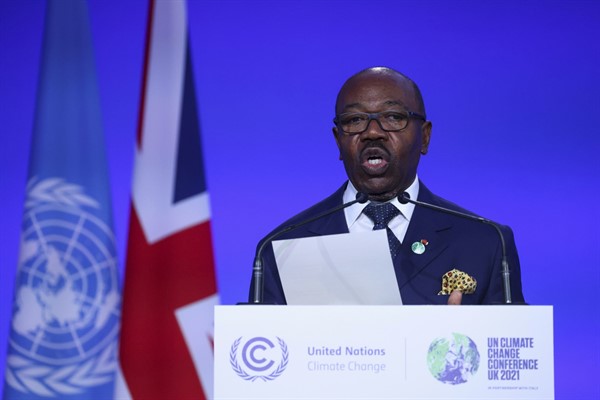Gabon has long flaunted its green credentials, enjoying a reputation as a leader in global efforts to combat climate change and environmental destruction. In June 2021, that image got another boost when Gabon became the first country in Africa to receive a payout for having reduced its carbon emissions. In disbursing the first payment of $17 million, the Central African Forest Initiative, on behalf of the Norwegian government, committed to providing Gabon’s government with $150 million in conservation financing over 10 years for lowering emissions from forest loss in 2016 and 2017, compared to baseline data from 2006 to 2015.
In some ways, this green reputation is justified. As the recent payment implies, Gabon’s deforestation rate is low, at less than 0.08 percent—roughly 9,000 hectares per year—according to official data. It is one of the world’s few “carbon-negative” states, absorbing more carbon dioxide than it emits. This is in large part thanks to the biodiverse Congo Basin, which makes up 88 percent of the country’s landmass. The basin’s more than 20 million hectares of rainforests sequester around 140 million tons of carbon dioxide annually, much more than the 35 million tons Gabon emits. In 2002, then-President Omar Bongo won praise when he created 13 national parks to protect around 10 percent of the country’s land, a conservation effort that his son, current President Ali Bongo Ondimba, continued by establishing nine marine parks and 11 marine reserves in 2017.
On the international stage, too, Gabon has been a vocal environmentalist. It chaired the group of African negotiators at the United Nations’ COP26 climate conference in Glasgow last fall, where it pushed wealthy countries to direct more funds to developing countries for climate adaptation. It also advocated a reform of the REDD+ system, which allows highly forested countries that absorb high amounts of CO2 to trade in carbon credits, and joined more than 70 other countries in setting an emissions-reduction target, committing to reduce greenhouse gas emissions by at least 50 percent by 2025. And it launched a “Green Gabon” national plan to contribute to the United Nations’ Sustainable Development Goals.

